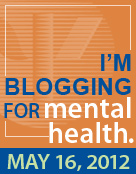The Truth About Anorexia
Anorexia is not a choice.
Anorexia is not a lifestyle.
Anorexia is not about vanity. Or being thin. Or seeking attention. Or...
Anorexia is a serious, potentially life-threatening mental illness that effects millions of people—women and men, young and old, rich and poor, black or white.
Anorexia could strike your loved one. Or your mother. Your girlfriend.
Or you.
 I didn't set out to become anorexic. No one does. So what propels someone to get caught in a downward spiral of starvation and self-harm and self-hatred? What compels someone to count every calorie, scrutinize every ounce of flesh, and self-flaggelate for every miniscule and imaginary flaw?
I didn't set out to become anorexic. No one does. So what propels someone to get caught in a downward spiral of starvation and self-harm and self-hatred? What compels someone to count every calorie, scrutinize every ounce of flesh, and self-flaggelate for every miniscule and imaginary flaw?
I don't know.
In the past, I have tried to find answers to why I—a seemingly healthy woman (but more about that later)—would succumb to anorexia. But at some point, both myself and my eating disorders psychiatrist agreed that the time was past for that. I was starving and I was dying, and that was enough.
Anorexia is about being cold. And lonely. And afraid.
And very, very depressed.
While in the depths of anorexia, I wanted to die. By malnutrition. By a heart attack. By anything, as long as I didn't have to remain in what I viewed as a painful and ultimately soul-killing world.
Did I romanticized death by anorexia? Perhaps. But I didn't care. I wanted out, but I didn't have the strength to do it myself.
Except I was starving myself.
Anorexia is about lost dreams and lost opportunities. About lovers spurned and friends left by the wayside. About an unfulfilled life, a life where numbers and weight and size is all that has meaning.
Anorexia is a nightmare while you are still awake.
I attempted to live some semblance of a life while still struggling with anorexia. I went to Haiti on a medical mission, and both served on the prayer team and wrote about it for the local newspaper.
I continued my job as a full-time journalist and, at first, continued my volunteer work reading to and spending time with a disadvantaged child.
But was I really engaged? No. My anxiety raged even as I starved myself and my body become more diminished. I struggled to exert exact control over it all, and when I couldn't, I fed on tranquilizers and pain killers, numbing the internal pain.
I was cold, and my world and my life constricted until nothing was left but anorexia.
And now? The thoughts are still there. Don't eat. You don't deserve to eat. You are worthless. You are ugly.
Things would be better if you only were thin.
But being thin, really thin, did nothing for me and almost cost me my life. Because it isn't really about being thin. It is about control and fear and depression.
It is starvation borne out of desperation.
And that's the truth about anorexia.
APA Reference
Gambrel, A.
(2012, May 16). The Truth About Anorexia, HealthyPlace. Retrieved
on 2026, March 5 from https://www.healthyplace.com/blogs/survivinged/2012/05/the-truth-about-anorexia
Author: Angela E. Gambrel
This is such a personal and brilliantly written blog, thankyou so much for sharing it, it's the harsh truth and reality of the illness xx
Thank you, Sarah! I know you—and I— can beat anorexia!
Keep fighting!!!
[...] Surviving ED (A Healthy Place Blog) – The Truth About Anorexia [...]
[...] Surviving ED (A Healthy Place Blog) – The Truth About Anorexia [...]
What a powerful piece. Really powerful. Like yourself, I continued to strive for professional perfection, with a 'everything is fine, I'm getting thin' attitude to carry me through the starvation and the black hole I saw and wanted to fall to. It takes bravery, courage and strength to recover, I am still fighting, but to cheat death by anorexia...now, that's the romance. Beating it.